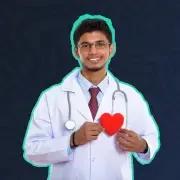Heart Palpitations: Things You Must Know
In This Article
Heart Palpitations: Things You Must Know
Dr. Ananya Ghosh
Updated on July 05, 2024
Medically verified by Dr. Arya
Fact checked by Sreemoyee

Cardiology
10 min read
Are you anxious about your heart flip flopping hard inside your chest? Well, you are at the right place. This loud beating is known as palpitation.
Karetrip is here to address any issue regarding your dear heart with utmost care.
Physicians report that heart palpitations are some of the common complaints of patients that visit them.
What is heart palpitation?
Heart palpitations refer to the unusual loud beating of the heart that feels as if the heart is pounding strongly inside your chest. Doctors say this is usually harmless and not a medical emergency.
You may feel this by sudden up beating of your heart near your throat or in your chest. This can be felt at any time of the day even at night.
There are some triggers that may cause heart palpitations. Such triggers are:
-
High intensity exercise.
-
After a full meal of fat enriched foods.
-
Before or during your periods.
-
Anxiety or panic attacks
What Causes It?
Medical research is not clear about the reason behind heart palpitations. There may be certain trigger points to experience these.
As this doesn’t pose serious problems to the patients, heart palpitations are not something to worry about. Moreover, you must be cautious regarding the danger signs of any incoming serious heart ailments and act wisely.
Let us see in detail what may be the hidden reason behind you getting heart palpitations.
Workout: Specifically, the high intensity cardio which makes your heart beat faster. This is quite natural and not to worry about.
Emotional upsurge: Some people complain of palpitations of the heart during any emotional events like anxiety, depression, panic attacks, long term unsolved stress or excessive fear of something or someone. Such psychological outbursts increase the hormones in your body tending you to face palpitations.
Pregnancy: This is the time when a myriad of unusual events can be seen. Heart palpitations are again seen due to compromised space in the body cavity where the heart is forced to work double time to keep the growing baby safe and healthy.
-
Certain foods: Some foods may make you experience palpitations, like nutritional supplements or high doses of caffeine.
-
Addictions: Alcohol, smoking (nicotine), any kind of substance abuse may lead to mild to severe heart palpitations.
-
Thyroid problems: Over or under stimulated thyroid gland may give you heart palpitations.
-
Medications: Antibiotics, decongestants, inhalers for asthma, blood pressure medications, thyroid drugs
-
Others: There may be other causes of palpitations like your body faces dehydration, severe blood loss, high fever or deficiency of potassium and sodium.
Tests That Confirm There’s Nothing To Worry
If you feel your heart palpitations are due to some sort of hidden disorders, keep no doubts. Get tested to confirm the disease.
The tests that can confirm are:
-
ECG- Electrocardiogram
-
Echocardiogram
-
Event monitor
-
Holter monitor
Your doctor is the best person to decide which test you need.
 9 min
9 min Best Cardiac Hospitals in Bangalore: Heart Care Specialists
 10 min read
10 min read5 Causes Of Heart Failure You Should Know About
 10 min read
10 min readHeart Disease: Important Signs, Symptoms and Types of Heart Problems
Get a Callback Now
How to Manage and Prevent Heart Palpitations
- Practice exercises for relaxation: You may try to relax yourself from the busy schedule of work life to keep your mind and heart healthy.
Restrain from alcohol and smoking: These are not only harmful for your overall health but are responsible for heart palpitations. Say no to these addictions and lead a happy and healthy life.
- Yoga: One of the best ways to keep your body and mind in their best health is yoga.
Speak with your doctors to change the medications if certain meds show side effects of heart palpitations.
-
Keep your thyroid under control: Take medications and restrain from certain foods that may imbalance your thyroid hormone.
-
Reduce your caffeine intake: Try to avoid coffee late at night to keep healthy.
Although this is not a serious health issue to address, our body gives some signs to correct certain events in our body. This is one such condition. It’s better to take precautions in time and act wisely for our wellbeing.
When to See A Physician?
Sometimes heart palpitations can be a danger sign if accompanied by other serious symptoms. You must rush to a doctor if you experience palpitations of the heart along with these symptoms:
-
Sudden intense chest pain
-
Shortness of breath.
-
Tendency to faint or lose consciousness.
-
Light-headedness.
-
Severe dizziness that is making you difficult to stand up.
-
Mental confusion to perceive your surroundings.
-
Pain radiating towards your neck, jaws or arms.
Heart palpitations are somewhat common in people nowadays. One must be cautious about their health and wisely decide when to rush to a doctor.
When it comes to our heart, we often tend to be anxious regarding any small symptom, which is good. Keeping an eye open for any danger to ourselves is very much needed. By doing so we can detect any unforeseen events at an early stage.
Heart palpitations are a condition where you feel your heart is beating loudly and heavily inside your chest.
This is the most common cause of emergency ward visits.
Doctors are not sure about the exact cause of the condition.
There may be certain trigger points to heart palpitations – heavy workout, pregnancy, heavy over eating of spicy foods, emotional upsurge, addictions, overstimulated thyroid, certain medications.
Some medical tests may confirm any other serious health condition – ECG, Echo, Holter monitor, Event monitor. These tests tell you if you have any heart.
You can manage and prevent heart palpitations by controlling your diet, exercising regularly, practising yoga, restrain from alcohol and nicotine, restrict your caffeine intake, take proper thyroid medications and speak with doctors to discontinue certain
You must visit your physician if you experience sudden intense chest pain, shortness of breath, tendency to faint or lose consciousness, light-headedness, severe dizziness that is making you difficult to stand up, mental confusion to perceive your surroun

